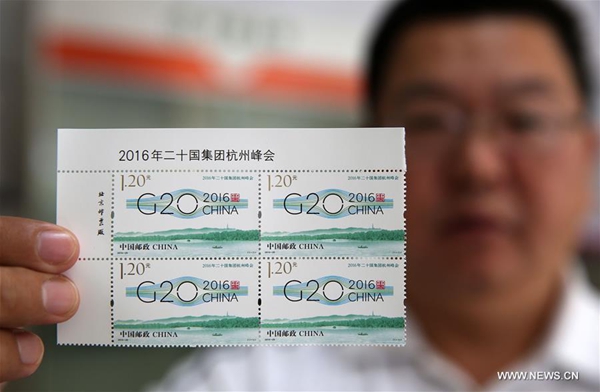No need for G20 to discuss overcapacity
- By Yang Yanqing
 0 Comment(s)
0 Comment(s) Print
Print E-mail China Daily, August 29, 2016
E-mail China Daily, August 29, 2016
|
|
|
A man shows commemorative stamps marking the upcoming G20 Hangzhou Summit in Handan, north China's Hebei Province, Aug. 27, 2016. China Post issued a commemorative stamp for the G20 Hangzhou Summit on Saturday. [Xinhua/Hao Qunying] |
Some developed countries want China's excess capacity to be put on top of the G20 summit agenda that starts in Hangzhou, Zhejiang province, in less than a week. Should the G20 summit focus on the issue?
People's Bank of China Governor Zhou Xiaochuan made a key point at the China Economists 50 Forum in February: Since China's overcapacity is a domestic issue, it should be resolved within the country, not at international conferences, in order to keep trade protectionist tendencies away.
We need to have a clear understanding of the correlation between overcapacity and international trade. People generally believe global trade is all about "absolute comparative advantage," as Adam Smith put it in his Wealth of Nations. But Zhou said:
"It does not conform to theories of classical economics, where, even without factoring in differences in resource endowments, a country may have higher capacity and therefore higher output of a certain product as a result of labor division; and, by the same token, other countries may have stronger production capacity and output of other products. This reflects clustering of production skills and equipment."
In other words, global trade is not possible without excess output capacity, as David Ricardo postulated in his theory of relative comparative advantage.
According to Zhou: "Structural issues and those involved in supply and demand of physical goods are actually rooted in price misalignments, and therefore product/industry related structural issues are all caused by pricing distortions."
How should we understand the relationship between structural layout and price in the context of overcapacity? From the micro perspective, no company will overproduce when prices are right. But from the global balancing perspective, however, without factoring in price distortions and unjustified subsidies, balanced market prices should never lead to continuous overcapacity. Serious overcapacity is ultimately attributable to structural problems, apart from the cyclical nature of economy and the temporary decline in demand because of a slowdown in growth.
Companies' production and capacity investments are always based on cost and profit analyses. If there is no cost or price distortion, and no subsidies are provided, manufacturers can use their rational judgment to avoid overcapacity.
But what if subsidies are provided? When subsidies are clearly in place, products should not be sold below cost price, according to the World Trade Organization's anti-dumping regulations. The WTO has also set explicit rules against "state trading", meaning international mechanisms are in place to guard against dumping and subsidies, and there is no need for G20 to pay too much attention to the issue and seek alternative solutions. And, more importantly, China does not provide any overt subsidies for industries suffering overcapacity.
But how should we tackle overcapacity caused by underestimated costs associated with environmental and climate change? By "internalization" of externalities. As Zhou said: "Internalization of carbon dioxide emissions involves factoring in relevant externalities in the cost of energy consumption and pollution/emission generation-that is, if you need to emit CO2, you should pay upfront the money needed to absorb the resulting emissions. This is what is involved in internalization of carbon emissions."
It follows that the trade in carbon emissions offers a pragmatic solution to the issue. It essentially requires manufacturers to price into their products costs associated with environmental and climate change, and ultimately reflect them in output prices. In this way, overcapacity arising from externalities can also be tackled through market forces.
Therefore, international debate on overcapacity should focus on whether subsidies are provided, and whether the variables depend on environmental and climate change. China has been taking proactive measures in this regard as it suffers huge losses because of air pollution and abnormal weather.
Many critics argue the "Christmas tree" phenomenon, where items are constantly added to a list of "core" topics of discussion in much the same way decorations are added to the Christmas tree, is evident at the G20: diversion of attention from fixing the global financial crisis to promoting economic growth. As a result, the G20 has lost focus on very important matters, and its influence and leadership in the international community has weakened. Therefore, the G20 should focus on core issues in order to restore its leadership and power of execution, instead of discussing unnecessary issues.
As for general overcapacity, it should be a domestic, rather than global, issue and should be resolved within the concerned country's pricing and trade policy framework. The disputes should be settled in accordance with the WTO rules. And the G20 should focus on resolving global issues related to climate change (that is, costs and subsidies associated with climate change) through existing international mechanisms and make efforts to end once and for all the lingering effects of the global financial crisis.
The author is the deputy editor-in-chief of China Business News.







Go to Forum >>0 Comment(s)